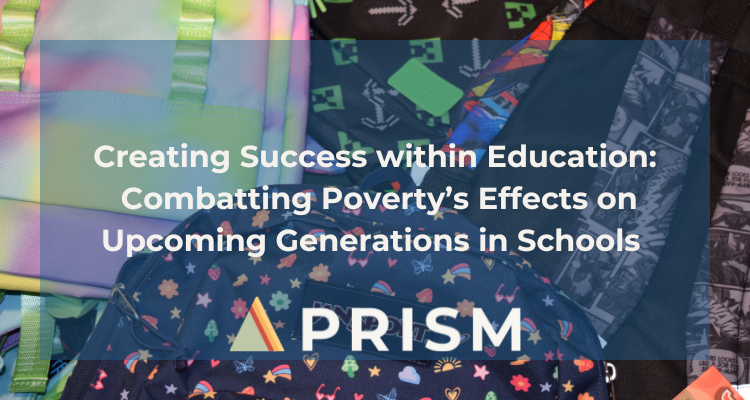
Poverty can severely affect students’ academic performance and overall well-being. Approximately 11 million children in the U.S. live with the consequences of poverty daily, accounting for nearly one-third of all people living in poverty in America. According to the US Census Bureau, children as a group are disproportionately poor compared to other age demographics. Ensuring the success of today’s children is not just a moral imperative, but a societal necessity. Investing in the success of our community’s children cultivates the leaders, innovators, and engaged citizens of tomorrow.
The consequences of living in poverty can present significant challenges and hinder a child’s success in school. Issues such as food insecurity, housing instability, and lack of academic materials make it difficult for students to concentrate, participate, and retain information in an educational environment. Families that are already struggling to make ends meet may choose to prioritize other basic needs before investing in education. Children from low-socioeconomic-status families are less likely to have experiences that encourage the development of fundamental skills, such as reading. Their initial reading competency often correlates with the home literacy environment, the number of books owned, and the guardian’s capacity to teach. These hardships contribute to achievement gaps, which negatively impact students’ development.
An achievement gap occurs when any group of students performs at a statistically lower rate than another group. These gaps are observed both at the individual student level and in school-wide test scores. Achievement gaps are measured by race, ethnicity, gender, or social class. When students from lower- socioeconomic-status families perform worse than their higher-income counterparts, it is known as a socioeconomic-status academic achievement gap.
Recognizing these disparities is the first step towards helping community members in need, the next is developing tangible strategies to address these issues within the community.
Addressing Basic Needs: PRISM’s Approach to Education
PRISM’s core values of collaboration and dignity drive us to initiate positive change within the community and empower families and students to build healthy, stable lives. Meeting basic needs is a critical first step toward achieving educational success, and the Marketplace Food Shelf is one such resource, allowing families to choose nutritious foods to fuel young minds.
Aligned with these values, PRISM’s Back to School Success program helps families prepare for the school year by providing a dignified experience where they get to choose the essential school supplies that are most meaningful to them. By ensuring that students start the school year equipped with adequate tools, we enable families to focus on other aspects of their lives that may lead to financial strain, giving them more flexibility to address other challenges they may face.
Community and School Partnerships
Effective partnerships between schools and community organizations are vital in supporting children facing the consequences of living in poverty. These partnerships provide resources and connections for community members in need.
PRISM has a history of collaborating closely with school districts, such as the Robbinsdale Area Schools, to identify and assist families in need. For example, PRISM has worked with district staff to open The Marketplace Food Shelf on designated dates specifically for families within the district facing food insecurity. These targeted efforts ensure that support is accessible and impactful for those in need. By partnering within the community, more people become aware of PRISM’s role as a resource and come to support the organization and its mission.
Successful community-school partnerships also include initiatives within the schools. In November 2023, Nasha Shkola, a k-8 Russian American Charter School, invited PRISM to help facilitate a school-wide food donation drive. After gathering in an all-school assembly and speaking on the impact of hunger within their community, students and staff members at Nasha Shkola collected 450 pounds of food to be donated to PRISM’s food shelf. Interactive initiatives like this advocate for those in the system who need help while demystifying the experiences of those living in poverty. Through this school food drive, community members, especially the children, continue to learn the importance of food security and poverty relief measures.
Combatting Poverty’s Effects for Brighter Futures
Investing in children’s education and well-being is one of the most effective and proactive ways to break the cycle of poverty. When children receive a quality education and have their basic needs met, they are more likely to succeed academically, secure better career opportunities, and position themselves to positively contribute to society as well as meet their basic needs, reducing the likelihood of them experiencing poverty’s effects as adults.
Investing in children’s education and well-being is one of the most effective and proactive ways to break the poverty cycle. When children have access to vital resources, receive quality education, and have their basic needs met, they are more likely to succeed, secure better career and life opportunities, and position themselves to maintain a healthy, stable life. This reduces the likelihood of them experiencing poverty’s effects in adulthood.
Creating success for upcoming generations requires a collective effort. Here are some ways you can support educational initiatives and help students in need:
- Volunteer with local schools and poverty relief organizations.
- Contribute to programs that provide school supplies, food, and financial support.
- Advocate for policies and changes that address educational disparities and support low-SES students and their families.
PRISM is committed to promoting educational success by addressing the challenges faced by students from low-income families. Through programs, partnerships, and advocacy efforts, PRISM strives to provide the support and resources needed to empower students and set them on a path to a brighter future.
Get involved, support educational initiatives, and join us in making a difference in our community. Together, we can help create a successful and equitable educational experience for every child.